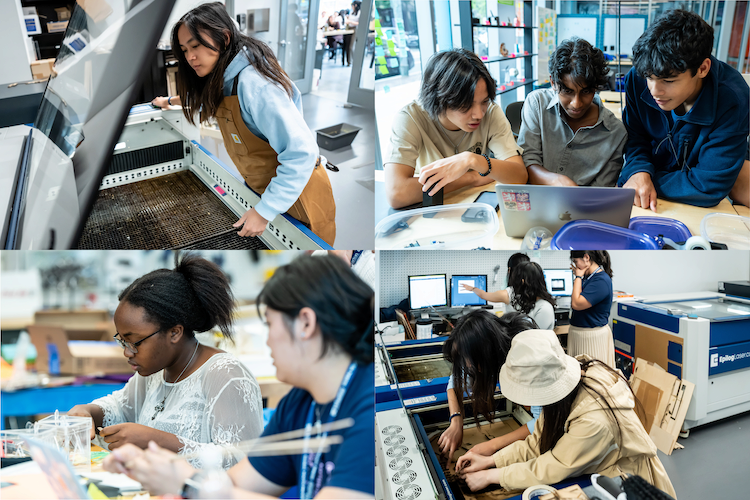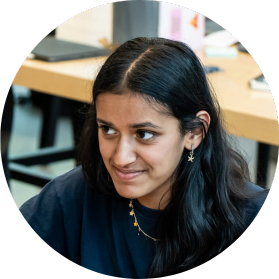Product Design Academy
Wharton’s Product Design Academy is a three-week deep dive into design thinking and product development. Through this studio-based program, students will identify customer needs, generate product concepts, prototype, and design a physical product for showcase.
Overview
The Product Design Academy is no longer accepting new applications for summer 2026. Previously submitted and in-progress applications will continue to receive full consideration for admission.
This three-week, hands-on program introduces students to the full design thinking process, from user research to product development. Working in teams, students will identify real-world problems, generate original ideas, and bring them to life through iterative prototyping. Along the way, they’ll gain technical skills using digital and analog tools in Penn’s Studios@Venture Labs and explore entrepreneurial strategies for turning their product into a viable business. No prior idea is required — students will discover opportunities through research and collaboration.Each summer, Product Design students:
All participants who complete the program will earn a Wharton Global Youth Certificate of Completion.
Each summer, Product Design Academy students:
- Learn how to approach problem-solving with empathy, creativity, and experimentation
- Conduct user research to uncover real-world needs and opportunities for innovation.
- Challenge assumptions and reframe problems to discover new possibilities.
- Collaborate in small groups to brainstorm, refine, and advance “new-to-the-world” product ideas.
- Apply the full design thinking process to evolve ideas into testable prototypes.
- Develop a keystone project that showcases a team’s innovation journey.
- Gain hands-on experience in Penn’s Studios@Venture Labs, using state-of-the-art digital and analog design tools.
- Build technical skills through exercises and mini-projects that teach computer-aided design (CAD), laser cutting, and 3D printing.
- Create physical prototypes that can be tested, validated, and improved.
- Explore entrepreneurial concepts like value proposition, product-market fit, and go-to-market strategy.
- Learn how to build a business around a product idea.
- Design with the end-user in mind to create solutions that are functional, practical, and impactful.
- Practice iterative testing to ensure your product meets user needs.
- Experience college life on Penn’s Ivy League campus while engaging in a rigorous, creative academic program.
- Explore historic Philadelphia, a city with a rich tradition of innovation and design.

Details
Academic classes are held Monday-Friday with extracurricular activities available in the evenings and on the weekends. Students move in on Sunday pre-program, and move out the final Saturday of the program. For more information on campus life, visit our residential experience page.
Schedule Exceptions:
Students should note the following schedule changes: Thursday, June 19- classes will not meet due to the Juneteenth holiday; there will be a Saturday class as a makeup.
A typical day includes:
- 9:00-10:30am – Topics lecture / CAD Demonstration
- 10:30-10:45am – Mid-morning break
- 10:45-12:00pm – Small group activity
- 12:00-1:30pm – Lunch
- 1:30-3:00pm – Prototyping Skills Activities
- 3:00-3:15pm – Afternoon break
- 3:15-4:30pm – Group Work Time in Studio
Session topics may include:
- User Research Techniques
- Synthesizing Qualitative Data
- Brainstorming Techniques
- Analog Prototyping
- Digital Fabrication Prototyping
- Large Scale Manufacturing Processes
- Product Launch Strategy
In the evening, students will have a number of extracurricular activities to choose from. Students can also opt to work on their final project with their group, meet with the program TAs, and/or relax at the dorm.
Program highlights may include:
- Food innovation such as designing 3D printed cookie cutters and baking cookies in the Tangen Hall test kitchen.
- Textile innovation such as a hands-on woven structure activity with a laser cut loom and activities where students create a fabric stamp with a repeat pattern they designed.
- Design sprints and prototyping activities to create a functional game or toy using a constrained array of materials.
Eligibility
Eligibility
High school students currently enrolled in grades 10-11 with a genuine interest in designing and fabricating a new to market product. No formal business background is required. International applicants are welcome.
Admission
Admission to Wharton’s Product Design Academy is selective. Selections are based on a record of academic excellence and demonstrated creative problem solving critiques. Interested students are strongly encouraged to submit an application by the priority deadline.
Please note that participation in the Product Design Academy does not guarantee admission into Penn.
Instructional Team
Program Leader: Taylor Caputo
 Taylor Caputo is a product designer, artist, and academic with a background in the fine arts, crafts, and 3D modeling. An alum of the Integrated Product Design Program at the School of Engineering, she is now the Director of the Studios @ Venture Lab, a Fabrication Lab open to the entire UPenn community. Taylor created and teaches the interdisciplinary How to Make Things and Design of Connected Objects & Experiences courses. She offered design consulting to various companies such as Away Travel, Puma, and BioMeme, and has exhibited her work internationally, notably at the 2016 Vienna Design Week and 2018 Milan Design Week. A proud Philadelphian, Taylor also enjoys indulging in the city’s vegetarian delights and is an avid weaver and potter when not teaching.
Taylor Caputo is a product designer, artist, and academic with a background in the fine arts, crafts, and 3D modeling. An alum of the Integrated Product Design Program at the School of Engineering, she is now the Director of the Studios @ Venture Lab, a Fabrication Lab open to the entire UPenn community. Taylor created and teaches the interdisciplinary How to Make Things and Design of Connected Objects & Experiences courses. She offered design consulting to various companies such as Away Travel, Puma, and BioMeme, and has exhibited her work internationally, notably at the 2016 Vienna Design Week and 2018 Milan Design Week. A proud Philadelphian, Taylor also enjoys indulging in the city’s vegetarian delights and is an avid weaver and potter when not teaching.
Teaching Assistants
Teaching Assistants consist of both undergraduate and graduate students from the University of Pennsylvania. TAs facilitate small-group discussions, lead small-group lab work, ensure student understanding, assist with final project development, and hold office hours to answer student questions.
Dates
- Jul 5 - Jul 25, 2026
Location
Philadelphia, USA (on campus)
Application Deadlines
Priority deadline:
January 28, 2026
Final deadline:
March 18, 2026
Application Deadlines
Summer 2024 applications are now closed
Contact
For more information, please contact whartonyouth@wharton.upenn.edu or call +1.516.414.5555.
 "I love that I got to build tangible things and bring my ideas to life. It was a special opportunity to use the Makerspace. For the first few days, I would leave class thinking, 'I’m new to this field, but if this was my job, I would be so happy.' The teachers also supported my ideas and encouraged me to explore them further.” - Sonia B., New Jersey, USA
"I love that I got to build tangible things and bring my ideas to life. It was a special opportunity to use the Makerspace. For the first few days, I would leave class thinking, 'I’m new to this field, but if this was my job, I would be so happy.' The teachers also supported my ideas and encouraged me to explore them further.” - Sonia B., New Jersey, USA


